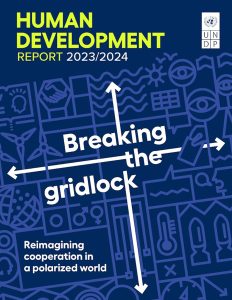Human Development Report 2023-24: Breaking the gridlock: Reimagining cooperation in a polarized world
By Ahana Lakshmi (ahanalakshmi@gmail.com), Independent Researcher, Chennai, India
The Human Development Index, or HDI, is probably the second most-used measure of a country’s development, after GDP. It uses a variety of indicators and gauges progress in terms of societal outcomes, including a healthy life (life expectancy index), knowledge (education index) and a decent standard of living (GNI index). Released by the UNDP every two years, the Human Development Report (HDR) benchmarks gains made by countries in terms of HDI. The 2024 edition of the report shows that while the global HDI is rising again, inequalities are growing between the countries at the top and bottom of the index. Mismanagement of cross-border dependencies has been shown to be at the root of many contemporary challenges.
 The Gender Inequality Index (GII) shows that Iceland continues to occupy top position, with the lowest levels of gender-based inequality. A small group of countries continue to be in the red but in other countries too, even if they have improved secondary education and labour force participation, the gender gap in the share of seats in parliament continues to be high. The Gender Social Norms Index was introduced in 2019 comprising four dimensions: political, educational, economic and physical integrity. The 2023 Gender Social Norms Index shows that gender equality is being constrained by social norms biased against women. Belief that men make better leaders than women is so entrenched that women leaders tend to be judged more harshly; limiting the effectiveness of policies and curbing women’s agency even when policies for gender equality are in place.
The Gender Inequality Index (GII) shows that Iceland continues to occupy top position, with the lowest levels of gender-based inequality. A small group of countries continue to be in the red but in other countries too, even if they have improved secondary education and labour force participation, the gender gap in the share of seats in parliament continues to be high. The Gender Social Norms Index was introduced in 2019 comprising four dimensions: political, educational, economic and physical integrity. The 2023 Gender Social Norms Index shows that gender equality is being constrained by social norms biased against women. Belief that men make better leaders than women is so entrenched that women leaders tend to be judged more harshly; limiting the effectiveness of policies and curbing women’s agency even when policies for gender equality are in place.
Applying a gender lens in all actions is crucial, especially in identifying potential gendered impacts of response measures. An example from the pandemic is given but can be applied to the fishing community. Fishermen are often the focus of relief measures, for example, during disasters and seasonal closures, as they are presumed to be the breadwinners; as a result, women who also suffer livelihood and income losses and may experience increased domestic violence and reduced wellbeing, are hardest hit.
World-wide discourse on the ocean is reflected in the HDR 2024 as well in a separate section titled ‘The Global Commons of Ocean Fisheries’, drawing attention to the problems of overfishing and property rights at various levels, and proposing radical solutions such as extending the Exclusive Economic Zone (EEZ) to its maximum extent while eliminating the idea of high seas or closing the high seas to fishing. But will such proposals work?
Overall, the report calls for strong actions to improve the HDI, the first being a 21st century architecture for global public goods such as a clean environment, public health, property rights, peace and security. It also calls for collective action across groups through public reasoning and deliberation, to reverse social polarization and enhance cooperation.
https://hdr.undp.org/system/files/documents/global-report-document/hdr2023-24reporten.pdf